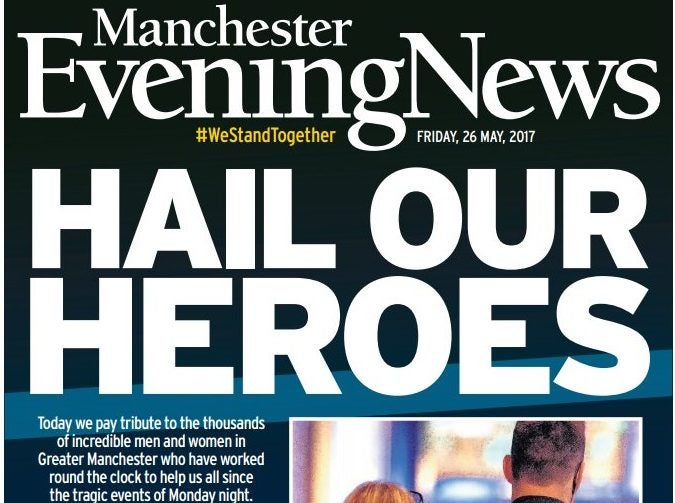
The UK’s largest press regulator should consider writing new guidelines to deal with media intrusion in the wake of terror attacks, according to a review into the aftermath of last year’s Manchester Arena bombing.
The Kerslake Report, published today, said “intrusive and overbearing” media behaviour had resulted in “most” families of those killed and injured in the attack on 22 May, 2017, having negative media experiences.
Regional daily newspaper the Manchester Evening News was praised for its local coverage, which editor-in-chief Rob Irvine said proved the press can play a “positive role”.
The report was commissioned to look into the preparedness for and response to the attack – which killed 22 men, women and children – including press coverage and contact with victims’ families.
It recommended that press watchdog the Independent Press Standards Organisation review its code and consider developing specific media guidelines for such an attack.
Some of the behaviour from journalists covering the Manchester attack “fell well short” of the Editors’ Code of Practice, the report found, adding this “cannot be as good as it gets”.
The child of one family was given condolences on the doorstep by a reporter before official notification of the death of her mother.
Another family’s daughter was visited by a reporter on the morning after the attack and given condolences on the death of her brother. Her family were not told their son was likely to be among the fatalities until later that day.
At the Etihad Stadium support centre, families had to run to their cars with coats over their heads to escape media crews, who were taking photos of families being given news of bereavement through the glass windows.
There were at least two cases of impersonation, including one family member talking on the phone to someone claiming to be a bereavement nurse.
One respondent to the review described a reporter attempting to gain access through their front door by ramming a foot in the way.
Families were also upset to see photos being taken from social media, inaccurate details such as a wrongly spelled name, and international media using an image taken inside the arena foyer in which the deceased could be identified.
Some of the negative experiences told to the Kerslake panel included:
- “The whole family felt ‘hounded’ by the press”
- “They sneakily took a photo of my sister when we were getting the news”
- “By far the worst thing was the press”
- “They … are a disgrace, they don’t take no for an answer, they have a lack of standards and ethics”
- “The press were not respectful of grief”
- “The press and media have been horrible in response to this. The press got hold of family members’ mobile numbers and ‘bombarded’ them.”
The report said: “The panel was shocked and dismayed by the accounts of the families of their experience with some of the media.
“To have experienced such intrusive and overbearing behaviour at a time of enormous vulnerability seemed to us to be completely unacceptable.
“We were concerned to identify what might be done to prevent this happening again in any future terrorist event.”
However, a number of families praised the coverage from Trinity Mirror’s MEN, which helped establish the We Love Manchester emergency fund and raised £1m within 24 hours.
One family said: “The information in the Manchester Evening News was correct, but when national press picked it up it would change.”
Irvine, who steps down as MEN editor at the end of this month, said: “Lord Kerslake’s report confirms that there is a positive role that the press can play in communicating on behalf of families and in fundraising.”
The MEN raised a total of £2.5m for victims’ families, which was included in the £20m We Love Manchester Emergency Fund that Irvine said was “helping the bereaved and those most affected”.
Other victims who travelled to the concert from further afield praised their local newspapers, with one describing the coverage as “amazing”.
Lord Bob Kerslake also advised giving police family liaison officers more training to improve how they handle media contact with families, alongside collaborative working with IPSO.
The report suggested better engagement from statutory responders with “trusted” local press and broadcasters as key participants in planning responses to major incidents.
This would “anticipate and test out ways in which families and victims can be best protected from inappropriate press approaches, whilst recognising the legitimate desire of journalists to report on the human impact of such events,” it said.
Irvine said he was pleased to see this recommendation, adding: “The MEN played a key role in helping communicating the facts to the public and we also gave a voice to the people of Greater Manchester who rallied together and around those affected by this atrocity.”
Finally, the report recommended that emergency services and local authorities review their press office resources and ensure they are able to increase capacity in response to a major incident.
Matt Tee, IPSO chief executive, said: “I have read the recommendations made by Lord Kerslake and we will certainly be looking at what more we can do to support victims, families and the agencies that work with them in situations such as the Manchester attack as well as making sure that IPSO-regulated publishers are aware of their obligations and responsibilities under the Editors’ Code of Practice.”
Picture: Trinity Mirror
Email pged@pressgazette.co.uk to point out mistakes, provide story tips or send in a letter for publication on our "Letters Page" blog
